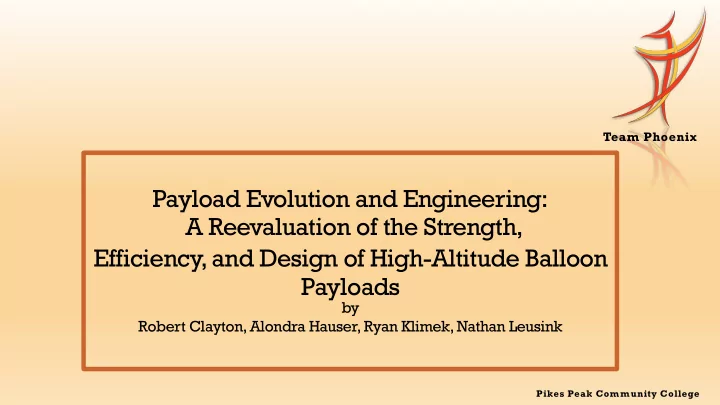

Team Phoenix Payload Evolution and Engineering: A Reevaluation of the Strength, Efficiency, and Design of High-Altitude Balloon Payloads by Robert Clayton, Alondra Hauser, Ryan Klimek, Nathan Leusink Pikes Peak Community College
Mission Overview • Mission Objectives • Create a highly-efficient balloon payload that maximizes strength and volume and minimizes weight • Use an efficient and lightweight circuit package capable of running a variety of atmospheric sensors CUSRS – 2018 2
Payload: Before and After Previous Design Box New Design Sphere CUSRS – 2018 3
Exterior Design Structure • Balloon payloads have to survive the harsh conditions of near space • The spherical shape maximizes strength and volume while minimizing weight CUSRS – 2018 4
Testing Shapes Tested a sphere, cube, tetrahedron, pyramid, and dome CUSRS – 2018 5
Crush Test • Shapes were crushed using a hydraulic press • The force at which each shape shattered was recorded CUSRS – 2018 6
Crush Test Results ! " # $ 3D Geometric Shape Volume (cm ³ ) Weight (kg) Crushing Force (N) %& ' Square Pyramid 53.57 17.65 1457.91 253.86 Sphere 90.00 15.70 1423.43 519.73 Cube 171.51 30.85 1556.88 281.48 Tetrahedron 30.18 8.72 622.75 248.31 Dome 45.00 12.26 1467.91 439.47 CUSRS – 2018 7
Circuit Redesign – Overview Circuit Redesign – Overview CUSRS – 2018 8
Teensy Brand Circuit Board Redboard Features Teensy 3.5 Features • 16 MHz Processor • 120 MHz Processor • 32 K Flash Memory • 512 K Flash Memory • 6 Analog Inputs • 25 Analog Inputs • 8 Bit Power mode/10 Bit ADC • 32 Bit Processor • Board Weight: 18 g • Board Weight: 5 g • External OpenLog SD port • Native 4 Bit SD port required CUSRS – 2018 9
Circuit Design and Testing Redesign Process: 1. Program/wire on Redboard 2. Transfer sensor package to Teensy 3.5 3. Calibrate sensors 4. Program SD card port 5. Test sensors and circuit: freeze, impact, whip, and flatSAT tests CUSRS – 2018 10
Circuit Problems Solved Solution: Problem: 1. Adjust code for 3.3V input 1. Sensor readings too large pins 2. Fluctuating sensor readings 2. Run heater on separate circuit, 3. Inoperable SD card port use Teensy 3.5 3. Use SD.h and SD_t3.h libraries CUSRS – 2018 11
Expected Data vs. Flight Data CUSRS – 2018 12
Applications Strength • Severe weather exploration • Future DemoSat teams CUSRS – 2018 13
Applications Low Weight • Future DemoSat Teams • Exploration of ultra-light weight materials CUSRS – 2018 14
Applications – Low Cost Low Cost • Can be used in any industry • Future DemoSat Teams • Radiosondes (NOAA) CUSRS – 2018 15
Applications of Design Radiosonde $325 per launch X 92 locations X 2 launches daily X 365 days a year = $21,827,000 Source: National Weather Service CUSRS – 2018 16
Comparing Costs Radiosonde New Design $10,000,000 $22,000,000 CUSRS – 2018 17
Lessons Learned It is critical to: • Understand the characteristics of the circuitry • Understand the material of our structure and provide adequate thermal insulation CUSRS – 2018 18
Goals Achieved • Optimized the payload while maximizing capabilities • Collected sample atmospheric data • Teensy 3.5 has the potential to be a more powerful and efficient circuit for atmospheric data gathering CUSRS – 2018 19
Thank You! CUSRS – 2018 20
Recommend
More recommend